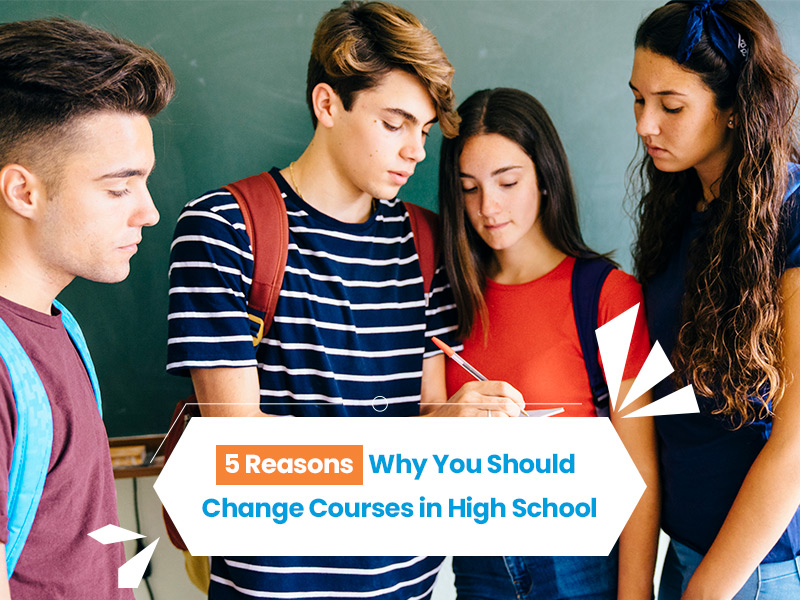The Best AP Classes to Take – 5 Reasons Why You Should Change Courses in High School
Whether you’re looking for easy schools to get into or reading up on top Ivy League schools, you probably have some questions about AP courses. Choosing the right courses or the best AP classes to take often happens after choosing the wrong courses first. Every year, we find our students making some of the same common mistakes when it comes to course selection. Thankfully, most high schools are willing to work with you to make adjustments. Here are the most common course changes you should consider.
How Many AP Classes Should I Take? – Too Many Weighted Courses
As they say, too much of anything is a bad thing, and weighted coursework is no exception. How much is too much?
First, it depends on a student’s prior performance. Looking at how you did in a similar class should provide a clue about your readiness for weighted coursework. If, for example, you earned a B/B in English Honors, think twice before taking AP Lang (after all, your goal is to earn an A, not a B). The same logic applies for any subject. Taking weighted courses because you heard “it makes you look good” for college is foolish. There’s no hard data to support this common myth.
Secondly, it’s usually a bad idea to take over 4 APs in a semester. No matter who you are, maintaining A’s in that many weighted courses at once saps time away from profile-building outside of class.

Which AP classes Should I Take? – Weighted Courses in the Wrong Areas
Students majoring in Engineering derive little to no benefit from the headache of AP US History, especially if they don’t enjoy history to begin with. Likewise, students majoring in history derive little to no benefit from taking AP Calculus BC, especially if they don’t like math. We see students signing up for weighted courses that have nothing to do with their major—or interests—all the time! Taking AP courses you aren’t strong in ruins GPAs every year. So do yourself a favor and replace your weighted coursework with classes that have more to do with your major or your interests.
Read more here to find out the weighted courses that make sense – and which don’t – depending on the major you are indicating towards.
AP Physics for CS/Engineering Majors in 11th
Computer Science and Engineering majors keep making this one mistake: not taking physics until senior year. If physics is an option for 11th grade, we strongly recommend CS/Engineering majors take it because:
- It demonstrates aptitude towards CS/Engineering departments
- It prepares you for the field of study you’re trying to pursue
Even better is taking AP Physics 1 in 11th grade, opening up the opportunity to then take AP Physics C in 12th. Note that taking physics any later than the 11th grade wouldn’t allow a student to report your grade until after college application deadlines, which is too late by our books.
AP Psychology for Biology or Business Majors
Having a back-up plan is always good. Intended Biology majors sometimes find themselves stuck with a really hard AP Biology class or teacher, and a pair of B’s can really wreck your plan of majoring in Biology. Likewise, prospective Business students often have bad luck in core classes that are important for business admissions, like English and math.
We recommend taking Psychology or AP Psychology in 11th grade so that if you struggle in core classes later on, you can still turn to Psychology as a backup major. Once you’re in college, you can easily change from Psychology to a variety of majors including Business, Biology, Chemistry, and Computer Science.

Accelerated Math with Weak Foundations
Taking an accelerated math course often doesn’t make you better at math; it makes you worse. It’s because you move so fast through the compressed curriculum that you don’t “learn” anything at all; rather, you’re just studying and taking tests before moving onto the next topic. For students who already lack strong foundations in math, this is an absolute nightmare and can do a lot more damage than one originally thought was possible.
So if you’re registered for an accelerated math course, be honest with yourself: are you 100% solid on the concepts you learned thus far? If not, either invest the time to prepare ahead of time, or simply take a pass on the course.
The Best AP Classes to Take – Recap & Conclusion
It is important to take classes that correlate with your major in order to build your profile. Your best strategy is to take key classes that relate to your major by 11th grade and only enroll in classes you know you can earn an A in.
Remember, do not tire yourself out by taking too many weighted courses or weighted courses that won’t have an impact on the major you want to study. You only get one GPA—use it wisely!
Looking for customized tips on course selection and insights into higher education trends? Sign up for a free initial consultation to get to know our team and learn how we can help you get into your dream school!
Podcast: Play in new window | Download


















